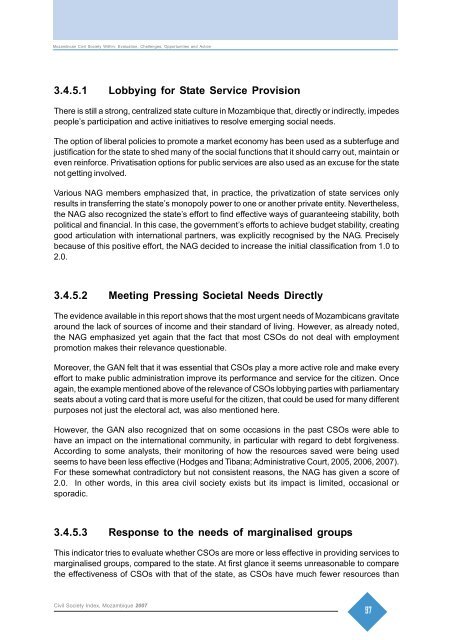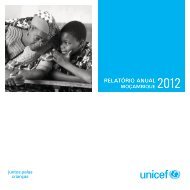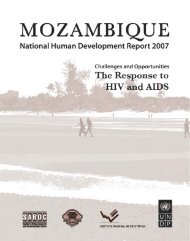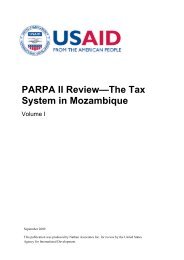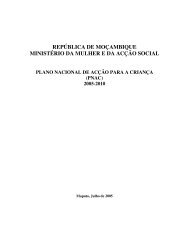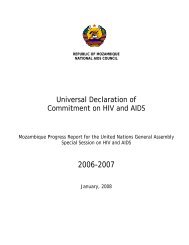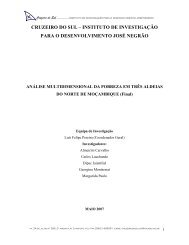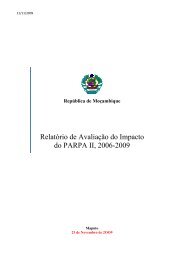Mozambican Civil Society Within: - UNICEF Mozambique - Home page
Mozambican Civil Society Within: - UNICEF Mozambique - Home page
Mozambican Civil Society Within: - UNICEF Mozambique - Home page
Create successful ePaper yourself
Turn your PDF publications into a flip-book with our unique Google optimized e-Paper software.
<strong>Mozambican</strong> <strong>Civil</strong> <strong>Society</strong> <strong>Within</strong>: Evaluation, Challenges, Opportunities and Action<br />
3.4.5.1 Lobbying for State Service Provision<br />
There is still a strong, centralized state culture in <strong>Mozambique</strong> that, directly or indirectly, impedes<br />
people’s participation and active initiatives to resolve emerging social needs.<br />
The option of liberal policies to promote a market economy has been used as a subterfuge and<br />
justification for the state to shed many of the social functions that it should carry out, maintain or<br />
even reinforce. Privatisation options for public services are also used as an excuse for the state<br />
not getting involved.<br />
Various NAG members emphasized that, in practice, the privatization of state services only<br />
results in transferring the state’s monopoly power to one or another private entity. Nevertheless,<br />
the NAG also recognized the state’s effort to find effective ways of guaranteeing stability, both<br />
political and financial. In this case, the government’s efforts to achieve budget stability, creating<br />
good articulation with international partners, was explicitly recognised by the NAG. Precisely<br />
because of this positive effort, the NAG decided to increase the initial classification from 1.0 to<br />
2.0.<br />
3.4.5.2 Meeting Pressing Societal Needs Directly<br />
The evidence available in this report shows that the most urgent needs of <strong>Mozambican</strong>s gravitate<br />
around the lack of sources of income and their standard of living. However, as already noted,<br />
the NAG emphasized yet again that the fact that most CSOs do not deal with employment<br />
promotion makes their relevance questionable.<br />
Moreover, the GAN felt that it was essential that CSOs play a more active role and make every<br />
effort to make public administration improve its performance and service for the citizen. Once<br />
again, the example mentioned above of the relevance of CSOs lobbying parties with parliamentary<br />
seats about a voting card that is more useful for the citizen, that could be used for many different<br />
purposes not just the electoral act, was also mentioned here.<br />
However, the GAN also recognized that on some occasions in the past CSOs were able to<br />
have an impact on the international community, in particular with regard to debt forgiveness.<br />
According to some analysts, their monitoring of how the resources saved were being used<br />
seems to have been less effective (Hodges and Tibana; Administrative Court, 2005, 2006, 2007).<br />
For these somewhat contradictory but not consistent reasons, the NAG has given a score of<br />
2.0. In other words, in this area civil society exists but its impact is limited, occasional or<br />
sporadic.<br />
3.4.5.3 Response to the needs of marginalised groups<br />
This indicator tries to evaluate whether CSOs are more or less effective in providing services to<br />
marginalised groups, compared to the state. At first glance it seems unreasonable to compare<br />
the effectiveness of CSOs with that of the state, as CSOs have much fewer resources than<br />
<strong>Civil</strong> <strong>Society</strong> Index, <strong>Mozambique</strong> 2007<br />
97


